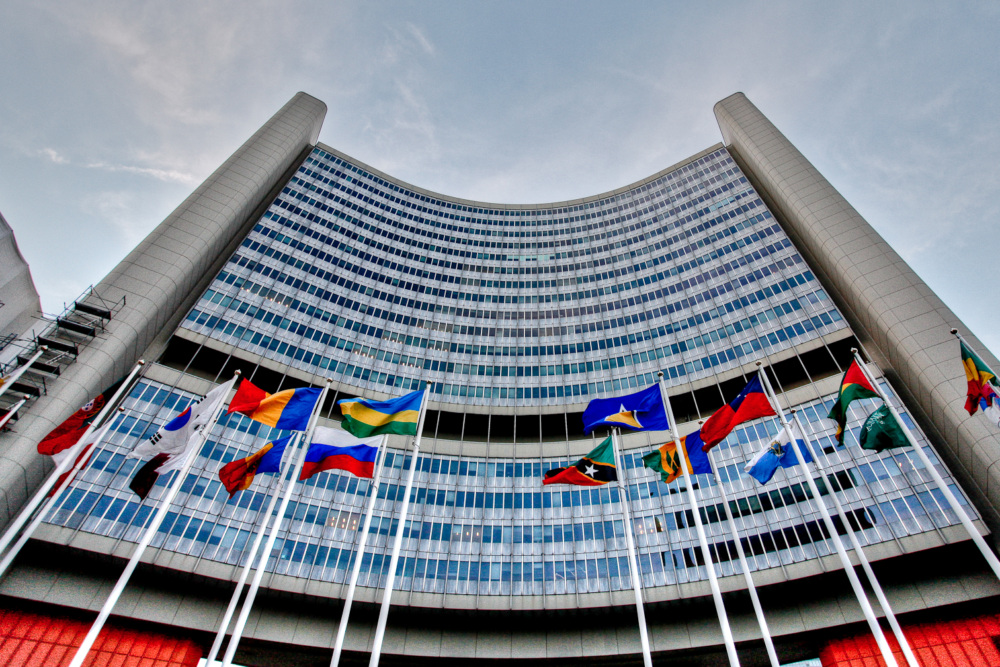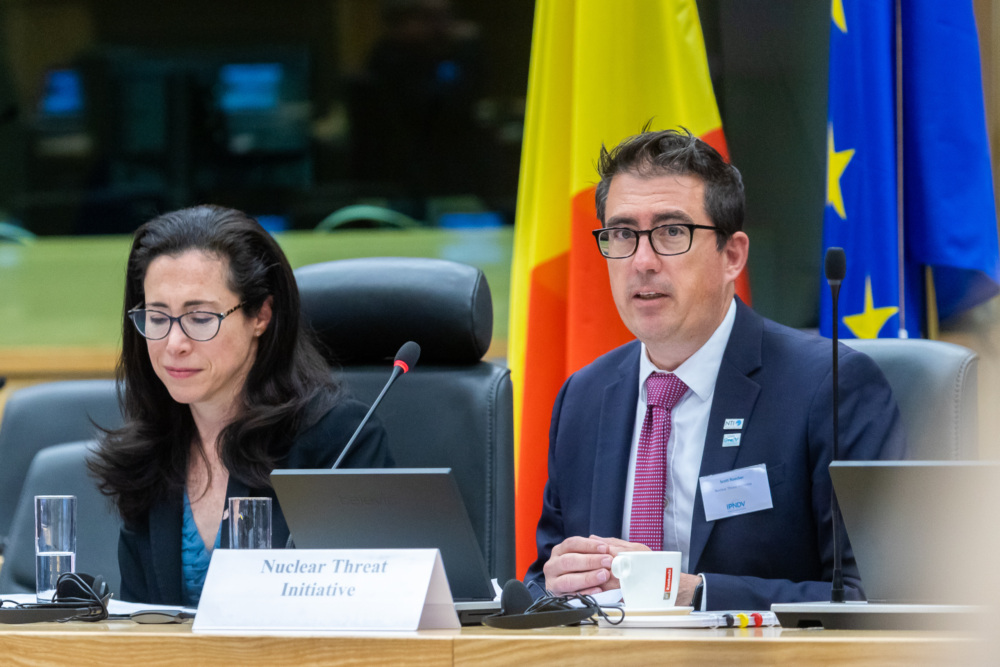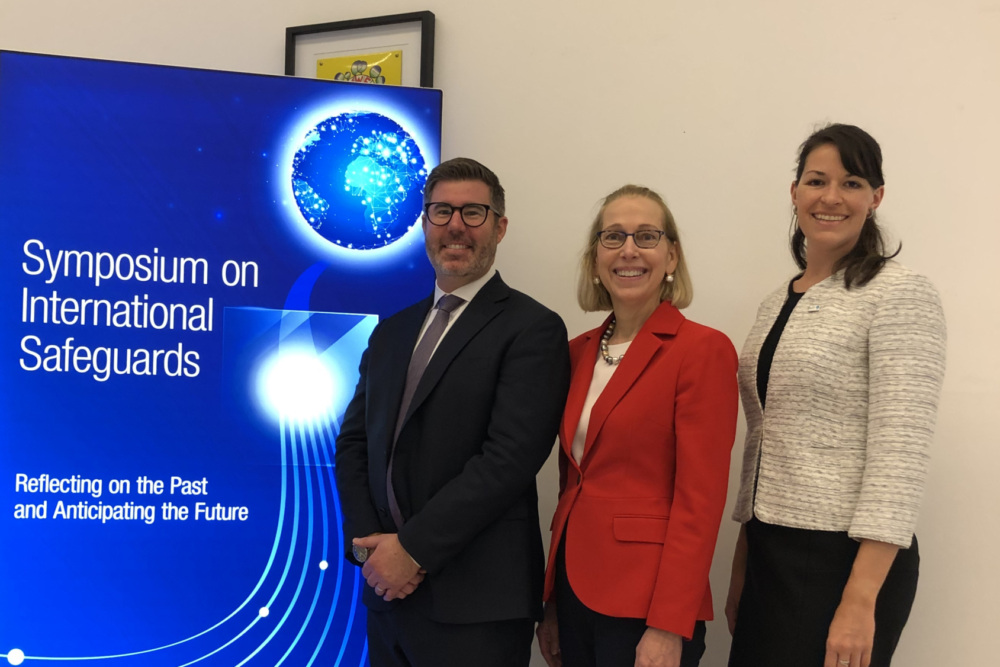
Jack Brosnan
Program Officer, Nuclear Materials Security
Atomic Pulse
About the image
Just weeks ago, the U.S. Justice Department announced nuclear materials trafficking charges against a leader of the Yakuza organized crime syndicate. Takeshi Ebisawa, a Japanese national previously indicted on narcotics trafficking and weapons charges, was the linchpin of a scheme to sell nuclear materials for use in a nuclear weapons program. Samples of material seized following Ebisawa’s arrest in New York were found to contain uranium and, even more concerningly, weapons-usable plutonium.
The details of how much material Ebisawa attempted to sell or where it came from have not been made public, but the fact that an organized crime boss was able to gain access to plutonium and there was a willing buyer should be top of mind this May when hundreds of ministers and senior government officials from around the world converge at the International Atomic Energy Agency’s (IAEA) International Conference on Nuclear Security (ICONS). The most effective way to reduce the risk that the building blocks of a nuclear bomb will fall into the hands of criminals and terrorists is for all nuclear facilities to have strong and sustainable security. ICONS offers a rare opportunity for governments to assess the current state of nuclear security, share their accomplishments, commit to new actions to reduce risk, and learn from one another.
The 2024 conference comes at a time when governments need to take urgent action to strengthen nuclear security. Threats to nuclear facilities are escalating and evolving in complexity. Sophisticated technologies like uncrewed aerial vehicles equipped with munitions are increasingly ending up in the hands of non-state actors. Russia’s willful endangerment of nuclear power plants and other facilities during the invasion of Ukraine drew attention to state-based threats to nuclear security, while rising conflict in the Middle East shows that terrorist groups remain capable of executing complex and devastating attacks. Meanwhile, the threat of domestic violent extremism is a growing concern in several countries with nuclear facilities. For both traditional non-state actor groups engaged in international terrorism and domestic violent extremists, critical infrastructure has proven to be a likely target, and nuclear terrorism an appealing means of pursuing an apocalyptic ideology.
Against this backdrop of escalating threats, stocks of weapons-usable nuclear materials are expanding. Global inventories of civil separated plutonium have increased by 17 metric tons since 2019, largely driven by reprocessing of spent nuclear fuel.1
Implementation of important nuclear security measures, meanwhile, remains stagnant, with regression in some key areas. Among the 46 countries and Taiwan with nuclear facilities, 25 have no regulations or licensing requirements for workers to report suspicious behavior; 31 do not require drug testing, background checks, and psychological and mental fitness checks for personnel; and 14 do not require a regularly updated design basis threat—the term for the process of assessing threats and establishing what tactics and capabilities nuclear operators should be required to defend against.
Unfortunately, the momentum generated at ICONS 2020 in support of international nuclear security cooperation has also diminished. Convened in February 2020, ICONS 2020 gathered a record turnout of 53 ministers who crafted a joint statement reaffirming the IAEA’s central role in nuclear security, identifying priority challenges, and encouraging national-level actions. Governments delivered more than 100 national statements, many of which highlighted actions or commitments by their countries to strengthen nuclear security measures – including an aggregate of more than $20 million in contributions to the IAEA’s Nuclear Security Fund, an extra-budgetary fund that supports nuclear security assistance to member states.
But within a few short weeks, activity came to a near standstill as COVID-19 made travel and in-person meetings an impossibility, and government attention shifted rapidly to pandemic response. The IAEA International Physical Protection Advisory Service, which provides peer review of national nuclear security arrangements, was suspended.
The rapid decline in US-Russian relations led to the demise of the Global Initiative to Combat Nuclear Terrorism, one of the key international partnerships engaged in nuclear security capacity building. These events occurred just as nuclear security experts were sounding the alarm that progress on protecting weapons-usable nuclear materials against theft and nuclear facilities against acts of sabotage had slowed significantly.
By 2023, half the countries with weapons-usable nuclear material had regressed in their implementation of nuclear security confidence-building measures. The encouraging trend of support for the IAEA through contributions to the Nuclear Security Fund, which is the lifeline for the agency’s nuclear security capacity building around the world, has also dwindled; less than half of the 22 countries with weapons-usable nuclear materials (10 of 22) and the 47 countries and areas with nuclear facilities (14 of 46) have made contributions to the fund in the last two years.
Meanwhile, climate change, energy insecurity, and national defense considerations are motivating countries to explore or pursue new nuclear power generation capacity; about 60 new nuclear reactors are under construction worldwide, with an additional 110 planned. Peaceful uses of nuclear energy could potentially bring a wide range of benefits to humanity, but an increase in the number of nuclear facilities around the world, and some next-generation reactor designs, particularly those calling for plutonium fuels, could create new targets for sabotage and theft.
These trends should be a wakeup call to governments to act now to restore progress on nuclear security. ICONS 2024 provides an opportunity to change course.
To strengthen nuclear security globally, governments should send diverse ministerial-level delegations to Vienna to shape an ambitious agenda for action and signal that commitment to nuclear security remains strong at the highest levels and that all countries have a role to play in preventing nuclear terrorism.
Member-state delegations at ICONS 2024 should use their national statements to share information and best practices as a nuclear security confidence-building measure. Statements should include updates on regulatory or legislative advances in nuclear security, including insider threat protection, security culture, cybersecurity, access control, armed response capabilities, material accounting, and performance testing, and they should set ambitious commitments for action in coming years. Governments, as able, should make and announce significant contributions to the Nuclear Security Fund to support the growing need for the IAEA’s nuclear security services.
In the run-up to ICONS 2024, governments should seek to rejuvenate the culture of deliverables that once existed in nuclear security by carefully considering what actions they can take, now or in the future, to strengthen their own nuclear security. Announcing an intent to participate in IAEA peer review tools by hosting International Physical Protection Advisory Service (IPPAS), International Nuclear Security Advisory Service (INSServ), and Integrated Regulatory Review (IRRS) missions can highlight opportunities for countries to assure each other of their nuclear security arrangements.
Countries with weapons-usable nuclear materials have the opportunity to plan and announce efforts to minimize or eliminate their stocks by converting test and research reactors to low-enriched uranium fuel, removing weapons-usable nuclear material from their soil, capping plutonium stockpiles at existing levels, or foregoing technologies that promote use of a plutonium fuel cycle. This could include announcements for consolidating and eliminating nuclear materials used for non-civilian purposes.
Finally, one key area that should be addressed at ICONS is the future of dialogue on nuclear security. This will be the first ministerial-level nuclear security event in more than a decade where governments had not agreed in advance to another high-level nuclear security meeting. Governments participating in ICONS should voice their support for these essential high-level multilateral conferences, including holding a review of the Amended Convention on the Physical Protection of Nuclear Material, the legal cornerstone of international nuclear security architecture, in 2027. This support should be reflected in the ICONS ministerial declaration.
Nuclear security will never be finished. It is an enduring process of improvement in the face of evolving threats, changing operational environments, and emerging technologies. Governments should seize this moment to take action to reaffirm their commitment to nuclear security, creating new momentum to drive progress. The challenges are immense, and so is the collective responsibility of governments to protect the world from the devastating impact of nuclear terrorism.
Sign up for our newsletter to get the latest on nuclear and biological threats.
Nuclear Security is Only as Strong as the Weakest Link: 2020 NTI Index Highlights Cybersecurity and Insider Threat Prevention
Scott Roecker, vice president of the Nuclear Materials Security team, sat down with NTI's Mary Fulham for the latest in Atomic Pulse's "Get to Know NTI" series.
NTI played a prominent role in this year’s IAEA Symposium on International Safeguards. Learn more about our what our experts were up to through this photo blog.



